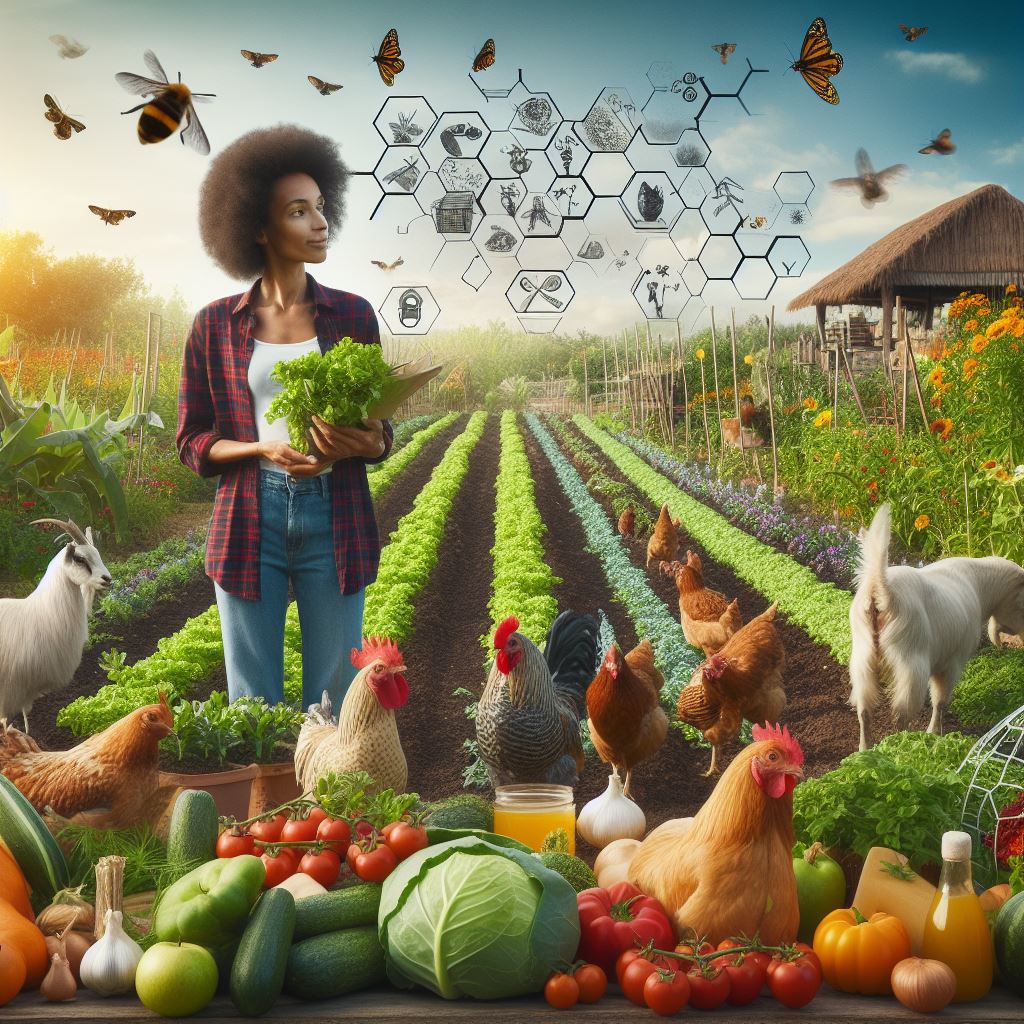Introduction
Taxation plays a pivotal role in shaping the landscape of sustainable farming practices.
In this blog post, we delve into how tax policies influence agricultural sustainability, explore key considerations for farmers, and discuss strategies to optimize tax management in support of sustainable farming initiatives.
Taxation in sustainable farming
Taxation plays a crucial role in sustainable farming, influencing investment decisions, resource allocation, and overall profitability.
By implementing tax strategies that incentivize sustainable practices such as conservation efforts, renewable energy adoption, and organic production, farmers can not only reduce their tax burden but also contribute to environmental stewardship and long-term agricultural sustainability.
Why taxation is important for sustainable farming
Taxation is important for sustainable farming as it provides funds for infrastructure development and support.
Taxation is vital for sustainable farming as it incentivizes environmentally friendly practices and resource conservation.
Through tax credits and incentives, governments can encourage adoption of sustainable methods like organic farming, water conservation, and renewable energy use.
Additionally, taxation can fund research and development for innovative technologies that enhance farm efficiency while minimizing environmental impact, advancing the sustainability of agriculture.
Main points of the blog post
This blog post will explore the significance of taxation in sustainable farming and discuss its main benefits
Historical Perspective on Taxation in Farming
The historical context of taxation in agriculture
- Taxation in farming has been prevalent since ancient civilizations and served as a source of revenue.
- Egyptians and Romans levied taxes on agricultural produce to fund infrastructure and military campaigns.
- Feudal societies imposed heavy taxes on peasants in the form of labor and crop-sharing.
- The purpose of taxation in farming varied, but it consistently played a significant role in governance.
Key events or policies that shaped taxation in farming
- The Magna Carta (1215) limited arbitrary taxation on property, providing some protection to farmers.
- Enclosure Acts in the 16th and 17th centuries consolidated land, leading to new tax structures.
- The introduction of income tax in the 19th century impacted wealthy landowners and agricultural income.
- The Great Depression and World Wars influenced tax policies to support agricultural recovery and food security.
How taxation has evolved over time to support sustainable farming practices
- Modern taxation systems increasingly focus on sustainable farming practices to protect the environment.
- Governments incentivize sustainable projects through tax credits, deductions, and exemptions.
- Tax policies promote the use of renewable energy sources and organic farming techniques.
- Reduced tax burdens on farmers adopting sustainable practices encourage wider adoption and long-term viability.
- Tax revenues are often reinvested in agricultural research, land conservation, and environmental protection.
Read: The Future of Farming: 2024 Policies
Current Taxation Policies and Practices in Sustainable Farmin
Overview of the current taxation policies related to sustainable farming
- Government implements specific taxation policies to support sustainable farming practices.
- These policies aim to promote environmentally friendly agricultural techniques and protect natural resources.
- Taxation policies consider the impact of farming activities on the environment and biodiversity.
- They also address the need for sustainable land use and reduce greenhouse gas emissions.
- Regulations may vary depending on the jurisdiction and the agricultural practices being followed.
Tax incentives and exemptions available for farmers implementing sustainable practices:
- Many governments offer tax incentives to farmers engaging in sustainable practices.
- These incentives aim to encourage the adoption of eco-friendly farming methods.
- Farmers can receive exemptions or reduced tax rates based on their sustainable initiatives.
- Common examples include deductions for investments in renewable energy systems or climate-smart technologies.
- Tax credits may also be available for sustainable soil management or water conservation efforts.
The role of taxation in encouraging sustainable farming methods:
- Taxation plays a crucial role in incentivizing farmers to adopt sustainable farming methods.
- By granting tax benefits, governments reward farmers for their contribution to the environment.
- Lowering the tax burden encourages more farmers to implement sustainable practices.
- These practices promote soil health, preserve water resources, and decrease pollution.
- Taxation policies can drive innovation in sustainable agriculture and influence the entire farming sector.
Taxation policies have a significant impact on the adoption and implementation of sustainable farming practices.
By providing tax incentives and exemptions, governments support farmers who prioritize environmentally friendly techniques.
Such policies not only contribute to the protection of natural resources but also create economic benefits for farmers.
Additionally, taxation plays a crucial role in encouraging innovation in sustainable agriculture, as farmers are motivated to explore new methods that can help them receive tax benefits.
However, it is important for taxation policies to remain consistent and clear, ensuring farmers have a clear understanding of the incentives available to them.
Transform Your Agribusiness
Unlock your farm's potential with expert advice tailored to your needs. Get actionable steps that drive real results.
Get StartedBy aligning tax policies with sustainability goals, governments can effectively encourage sustainable farming practices and contribute to a more resilient and environmentally friendly agricultural sector.
Read: Food Safety: Navigating 2024’s Laws
Benefits of Taxation in Promoting Sustainable Farming
Positive impacts of taxation on sustainable agriculture
Taxation plays a crucial role in promoting sustainable farming practices through various positive impacts.
Firstly, tax incentives and credits can encourage farmers to adopt sustainable agricultural practices.
By offering tax breaks to those who implement eco-friendly techniques such as organic farming or water conservation, governments can create an incentive for farmers to prioritize sustainability in their operations.
This not only benefits the environment by reducing pollution and preserving natural resources but also promotes healthier farming practices overall.
In addition, taxation can drive innovation and research and development in sustainable farming techniques.
Government-funded research programs often rely on tax revenues to finance studies that aim to develop and improve sustainable practices.
These funds can support initiatives such as finding alternative pest control methods, enhancing soil fertility, or advancing efficient irrigation systems.
Investing in research and development through taxation can result in breakthroughs that benefit farmers, consumers, and the environment in the long run.
How taxation can fund research and development of sustainable farming techniques
Taxation revenue can be used to fund research and development (R&D) in sustainable farming, leading to significant advancements.
The government, through tax revenues, can allocate funds to universities, research institutions, and agricultural organizations.
This financial support enables researchers and scientists to conduct experiments, gather data, and explore innovative techniques.
R&D in sustainable farming techniques enhances agricultural productivity while reducing environmental impact.
For example, funds can be utilized to study crop rotation systems that improve soil health and reduce the need for chemical inputs.
Furthermore, taxation can facilitate technology transfer and knowledge dissemination to farmers.
By using tax revenues, governments can organize training programs, workshops, and educational campaigns to inform farmers about sustainable practices.
This helps bridge the gap between scientific advancements and practical applications on the ground, promoting sustainable farming adoption.
How tax revenues can be used to support farmers transitioning to sustainable practices
Tax revenues can be allocated to support farmers in their transition towards sustainable farming practices.
Financial assistance programs, subsidized loans, and grants can be funded through taxation to provide resources and support to farmers.
These programs may help cover the costs of transitioning equipment, organic certifications, or even provide incentives for new sustainable infrastructure.
By offering financial support, governments empower farmers to implement sustainable practices with reduced financial burden.
Moreover, tax revenues can be used to establish farmer education and training programs.
These initiatives aim to equip farmers with the knowledge and skills required to successfully adopt and implement sustainable farming techniques.
Showcase Your Farming Business
Publish your professional farming services profile on our blog for a one-time fee of $200 and reach a dedicated audience of farmers and agribusiness owners.
Publish Your ProfileBy investing in farmer education, governments enable farmers to navigate the complexities of sustainable practices effectively.
This support contributes to the overall success and adoption of sustainable farming methods.
In essence, taxation plays a vital role in promoting sustainable farming practices through positive impacts such as tax incentives, funding research and development, and supporting farmers in their transition.
By utilizing tax revenues effectively, governments can foster a sustainable agricultural sector that benefits both the environment and farmers’ livelihoods.
Read: Green Zoning: Impact on Farm Practices

Challenges and Criticisms of Taxation in Sustainable Farming
Potential Challenges or Drawbacks Related to Taxation in Sustainable Farming:
- Tax burdens may disproportionately affect small-scale farmers, limiting their ability to adopt sustainable practices.
- The complexity of tax regulations and reporting requirements can overwhelm farmers, especially those with limited resources.
- Unclear definitions of sustainable farming practices make it difficult to determine eligibility for tax incentives.
- Some sustainable farming practices may not immediately lead to increased profits, making tax incentives less effective.
- High tax rates on agricultural land may discourage farmers from investing in sustainable practices.
- Tax incentives that favor specific practices may discourage innovation and diversification in sustainable farming.
- Taxation on agricultural inputs, such as fertilizers and pesticides, can undermine the affordability of sustainable alternatives.
- Tax policies often fail to consider the unique challenges faced by farmers in different regions or climates.
- The administrative burden of compliance with tax regulations can divert time and resources away from sustainable farming activities.
- Tax incentives may lead to unfair competition, favoring larger farms with the capacity to take advantage of them.
Criticisms Regarding the Effectiveness and Fairness of Tax Policies towards Sustainable Farming
- Some critics argue that tax incentives alone are insufficient to drive widespread adoption of sustainable farming practices.
- The effectiveness of tax policies heavily depends on proper enforcement and monitoring, which may be lacking.
- There are concerns that tax incentives may be abused or exploited by farmers who falsely claim to adopt sustainable practices.
- Critics argue that tax policies should address the root causes of sustainability challenges in the agricultural sector.
- The fairness of tax incentives is questioned, as they may benefit wealthier farmers who can afford to invest in sustainable practices.
- Detractors argue that tax policies should focus on supporting local food systems and small-scale farmers instead of offering blanket incentives.
- There is a lack of consensus on how tax policies should define and measure sustainable farming practices.
- Some critics argue that tax incentives should be directly linked to measurable environmental outcomes to ensure their effectiveness.
- Critics question whether tax policies alone can address the complex social, economic, and environmental challenges facing sustainable farming.
- There are concerns that tax incentives may unintentionally lead to the displacement of traditional farming practices and indigenous knowledge.
Possible Solutions or Suggestions for Improvement
- Provide targeted financial support, such as grants or subsidies, to assist small-scale farmers in implementing sustainable practices.
- Simplify tax regulations and reporting requirements to reduce the administrative burden on farmers.
- Establish clear and standardized criteria for defining sustainable farming practices to ensure consistency in tax incentives.
- Explore alternative ways of incentivizing sustainable practices, such as tax credits for farmers who demonstrate continuous improvement.
- Consider differentiated tax rates based on farm size or income to promote fairness and prevent concentration of benefits among larger farms.
- Develop region-specific tax policies that account for the unique challenges and opportunities in different farming areas.
- Integrate sustainability metrics into tax policies to directly link incentives to measurable environmental outcomes.
- Balance tax incentives with other support mechanisms, such as technical assistance and knowledge-sharing, to drive holistic change.
- Engage stakeholders from diverse backgrounds to ensure that tax policies align with the needs and aspirations of sustainable farmers.
- Foster collaboration between governments, farmers, and experts to continuously evaluate and improve the effectiveness of tax policies.
Overall, while taxation has the potential to play a crucial role in promoting sustainable farming, it is essential to address the challenges and criticisms associated with tax policies.
By acknowledging the unique circumstances of farmers, simplifying regulations, and exploring innovative approaches, tax policies can better support the transition towards a more sustainable agricultural sector.
Read: How 2024’s Laws Affect Food Quality
Case Studies: Successful Implementation of Taxation in Sustainable Farming
Countries or regions where taxation has played a significant role in promoting sustainable farming practices
- Netherlands: The government introduced a tax incentive program that encourages farmers to adopt sustainable farming techniques.
- Denmark: Implemented a carbon tax on agriculture, leading to reduced emissions and improved sustainable farming practices.
- Costa Rica: Levies a tax on agricultural chemicals, promoting organic farming and biodiversity conservation.
Through case studies in the Netherlands, Denmark, and Costa Rica, it becomes evident that taxation can play a significant role in promoting sustainable farming practices.
These countries have successfully implemented various tax programs that incentivize farmers to adopt environmentally friendly techniques.
In the Netherlands, the government introduced tax incentives, such as reduced tax rates on equipment and machinery related to sustainable farming.
This has encouraged farmers to invest in eco-friendly technologies and practices.
As a result, there has been a reduction in pesticide use, soil degradation, and a shift towards more sustainable agriculture.
Denmark, on the other hand, implemented a carbon tax on agriculture.
This tax has contributed to reducing greenhouse gas emissions in the sector, helping mitigate climate change.
Farmers have been incentivized to adopt practices that decrease carbon emissions, such as optimizing fertilizer use and implementing renewable energy sources.
Costa Rica took a different approach by levying a tax on agricultural chemicals.
This has encouraged farmers to shift towards organic farming methods, promoting biodiversity conservation.
By taxing harmful substances, the government has created a financial incentive for farmers to choose organic alternatives, benefiting both the environment and human health.
Outcomes and benefits achieved through effective taxation
- Environmental Preservation: Taxation incentivizes sustainable practices, resulting in reduced pesticide use and soil degradation.
- Climate Mitigation: Carbon taxes promote greenhouse gas reduction, leading to decreased agricultural emissions and positively impacting climate change.
- Biodiversity Conservation: Taxation encourages organic farming, fostering habitat protection and preservation of endangered species.
- Healthier Food Production: By taxing harmful substances, governments promote the production of safer and healthier food for consumers.
The outcomes and benefits achieved through effective taxation in these case studies are significant.
Firstly, sustainable farming practices contribute to the preservation of the environment.
Reduced pesticide use and soil degradation protect ecosystems and groundwater, ensuring long-term sustainability.
Secondly, effective taxation plays a role in climate change mitigation.
Carbon taxes incentivize farmers to reduce emissions, helping combat global warming.
This, in turn, has a positive impact on agricultural productivity and resilience to climate change impacts.
Thirdly, biodiversity conservation is enhanced through sustainable farming practices promoted by taxation.
By taxing agricultural chemicals, governments encourage the adoption of organic farming, which supports habitat preservation and protects endangered species.
Lastly, effective taxation leads to healthier food production.
Taxing harmful substances such as pesticides and chemicals ensures the production of safer and more nutritious food for consumers.
This helps address public health concerns associated with pesticide residues and chemical contamination.
Draw lessons and insights from these case studies
- Economic Incentives: Taxation can motivate farmers to adopt sustainable practices that have long-term economic benefits.
- Policy Alignment: Integration of tax policies with sustainable farming goals is crucial for successful implementation.
- Consultation and Stakeholder Engagement: Involving farmers, industry experts, and environmental groups in policy development ensures inclusivity and better outcomes.
- Monitoring and Evaluation: Continuous assessment of the tax program’s effectiveness is essential for making necessary adjustments and improvements.
- International Cooperation: Sharing successful tax implementation case studies can inspire and guide other countries in promoting sustainable farming.
These case studies provide valuable lessons and insights for countries aiming to implement taxation programs in sustainable farming.
Firstly, economic incentives play a crucial role in motivating farmers to adopt sustainable practices.
By highlighting the long-term economic benefits, farmers are more likely to invest in sustainable farming techniques.
Policy alignment is also important.
Taxation programs should be integrated with broader sustainable farming goals and strategies, ensuring consistency and coherence in policy approaches.
Consultation and stakeholder engagement are essential for successful implementation.
Involving farmers, industry experts, and environmental groups in policy development ensures inclusivity, better understanding of on-the-ground realities, and increased ownership of the tax schemes.
Monitoring and evaluation are critical in assessing the effectiveness of tax programs.
Governments should continuously monitor the impact of taxation on promoting sustainable farming practices and make necessary adjustments if needed.
Lastly, international cooperation is beneficial in promoting sustainable farming through taxation.
Showcase Your Farming Business
Publish your professional farming services profile on our blog for a one-time fee of $200 and reach a dedicated audience of farmers and agribusiness owners.
Publish Your ProfileSharing successful case studies, lessons learned, and best practices can inspire and guide other countries in their efforts to implement similar tax initiatives.
In summary, these case studies demonstrate the potential of taxation in promoting sustainable farming practices.
The outcomes and benefits achieved through effective taxation include environmental preservation, climate change mitigation, biodiversity conservation, and healthier food production.
By drawing lessons and insights from these successful case studies, countries can develop tailored tax programs that encourage sustainable farming and contribute to a more sustainable future.
Conclusion
Summary of the key points discussed in the blog post
In summary, this blog post highlighted the crucial role of taxation in sustainable farming.
Importance of taxation in supporting and promoting sustainable farming practices
It is essential to emphasize the importance of taxation in supporting and promoting sustainable farming practices.
Taxation is pivotal in supporting sustainable farming by incentivizing eco-friendly practices and funding research.
It fosters innovation, conservation efforts, and the adoption of renewable energy, ensuring the longevity and resilience of agriculture in the face of environmental challenges.
Call to action
As readers, let us take the initiative to support and advocate for fair and effective tax policies for sustainable agriculture.




